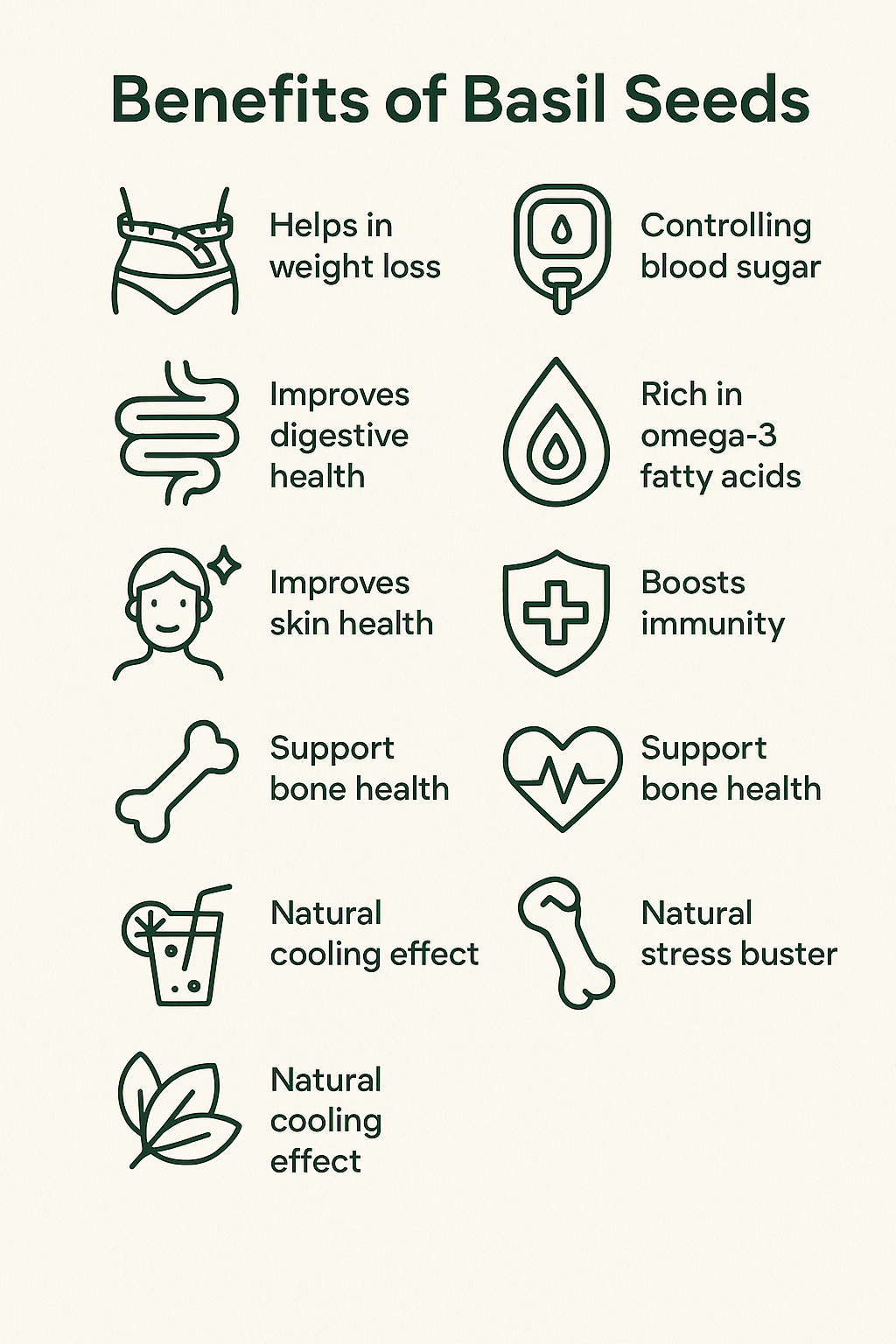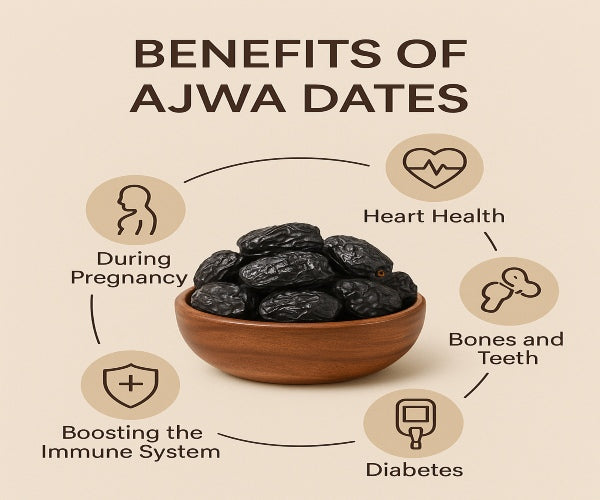Basil seeds are referred to as sajba seeds or tukmaria in Hindi. They are derived from the Ocimum basilicum, or sweet basil plant.
Used in traditional medicine, basil is an aromatic herb that helps with headaches, coughing, constipation, warts, worms, diarrhoea, and kidney issues. In addition, India and other Southeast Asian countries have been using the plant for millennia in their food and cosmetics.
Globally available, basil seeds have lately seen a sharp increase in appeal in the wellness sector.
Because of the vitamins and minerals they contain, basil seeds have several health advantages. They can help you lose weight and improve your digestion. The seeds of basil are used to flavour drinks.
The informational blog post for today covers a variety of topics, such as the background of basil seeds, their nutritional value, amazing health advantages, how to utilize them, and some commonly asked questions.
Nutritional Profile Value of Basil Seeds
|
Iron |
10% daily recommended intake (DRI) |
|
Magnesium |
10% of the DRI |
|
Calcium |
15% of the daily recommended intake (DRI) |
|
Fats |
3 grams (primarily omega-3 fatty acids) |
|
Fiber |
7 grams |
|
Carbohydrates |
7 grams |
|
Protein |
2 grams |
|
Calories |
60 kcal |
Top 10 Health Benefits of Basil Seeds
Basil seeds are said to be nutrient-dense and healthful. Continue reading to learn more about the health advantages of basil seeds.
1. Helps in weight loss - Basil seeds improve weight control by lowering appetite and preventing overeating. Their fibre content also aids in bowel movement regulation, which can promote a healthy metabolism.
2. Controlling blood sugar - Blood sugar levels can be stabilised with the use of basil seeds. For those with type 2 diabetes, this makes them a fantastic complement to their diet. Basil seeds' high fibre content ensures that sugar is taken into circulation gradually by slowing down digestion. By preventing blood sugar spikes, this leads to improved sugar management.
3. Improves digestive health - Mucilage, a gel-like material found in basil seeds, facilitates digestion. It encourages frequent bowel motions and gives the stool more volume.
4. Rich in omega-3 fatty acids - One kind of omega-3 fatty acid is alpha-linolenic acid (ALA). Omega-3 fatty acids lower inflammation in the body and are beneficial for brain and heart health. Eating basil seeds can improve cognitive function, decrease cholesterol, and lessen the risk of heart disease.
5. Improves skin health - Antioxidants, which are abundant in basil seeds, aid in the battle against free radicals. As a result, they cause skin damage and early ageing.
6. Good for heart health - Antioxidants like polyphenols found in basil seeds aid in the reduction of inflammation. Because polyphenols keep cholesterol levels in check and ensure that the heart is operating properly, they have been associated with a lower risk of cardiovascular disorders.
7. Boosts immunity - The immune system is strengthened by the vitamins, minerals, and antioxidants included in basil seeds. Additionally, seeds include antibacterial and anti-inflammatory qualities that boost the body's defences against infections and disorders, while also enhancing general health.
8. Support bone health - Magnesium and calcium support the growth of bones and the health of muscles. Consuming basil seeds, which are a rich source of calcium and magnesium, can help preserve bone density when your diet is deficient in these two nutrients. Magnesium and calcium also help to avoid diseases like osteoporosis. Thus, frequent use of basil seeds can support skeletal health and stronger bones.
9. Natural cooling effect - Because basil seeds are so delicious, they are used in summer drinks. Particularly in hot weather, drinking cool drinks like lemon water or falooda with basil seeds can help you keep hydrated and cool.
10. Natural stress buster - The body naturally cools down after eating basil seeds. It lowers body temperature. As a result, it helps lower anxiety and tension.
Also read - 7 Health Benefits of Chia Seeds
What are the Different Ways to Eat Basil Seeds?
Being aware of the health advantages of basil seeds guarantees their adaptability. To get all the advantages, add basil seeds to a variety of foods and drinks
-
In beverages - For extra texture and nutritional value, add soaking basil seeds to smoothies, lemonade, and other beverages.
-
In desserts - Basil seeds are frequently used in Middle Eastern and Indian sweets like kulfi and falooda. Additionally, you may include seeds into chia pudding or yoghurt.
-
As a thickening agent - Basil seeds have a gelatinous nature; thus, they can be used as a thickener in soups, sauces, and smoothies.
-
In salads - You can add basil seeds to fruits and vegetables. This is to provide them with an extra crunch and a fibre boost.
-
In baking - If you are vegan, use soaked basil seeds to substitute eggs. Mix 1 tablespoon of basil seeds with 3 tablespoons of water; let it rest for 15 minutes. Then, use this mixture as an egg replacement.
Also read - 11 Health Benefits of Pumpkin Seeds
Basil seeds, also known as tukmaria or sabja seeds, are a powerhouse of nutrients offering numerous health benefits. From aiding in weight loss and promoting digestive health to improving heart health and boosting immunity, these seeds are truly versatile. They can be incorporated into various dishes and beverages to enjoy their cooling effects and nutritional value.
However, moderation is key to avoid potential adverse effects like bloating or diarrhea. With their rich calcium, magnesium, and omega-3 content, basil seeds support bone health and overall well-being. Include them in your diet for a natural, nutritious boost to your lifestyle!
FAQs
Q1. Do basil seeds help you lose weight?
Yes, their high fiber content aids weight loss by reducing hunger.
Q2. Can basil seeds be given to kids?
Yes, in small quantities, but consult a pediatrician beforehand.
Q3. Can I eat basil seeds for acidity and heartburn?
Yes, their cooling nature may soothe acidity and heartburn.
Q4. How many basil seeds are ideal per day?
Around 1–2 tablespoons, soaked in water, is ideal for daily intake.
Q5. What are the side effects of basil seeds?
Overconsumption can cause bloating, gas, cramps, or diarrhea.




Leave a comment
All comments are moderated before being published.
This site is protected by hCaptcha and the hCaptcha Privacy Policy and Terms of Service apply.